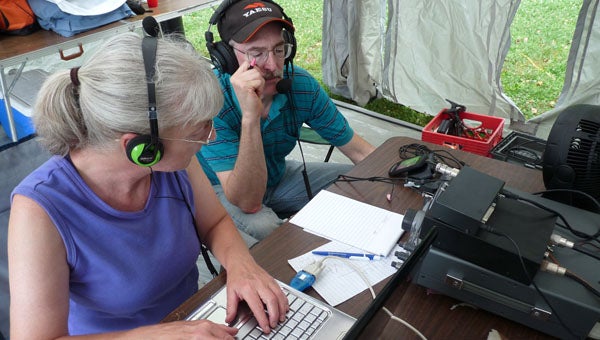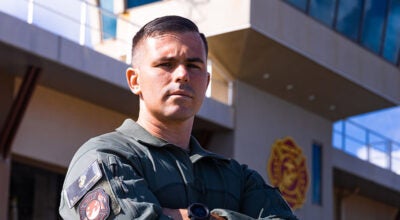Ham radio class scheduled
Published 9:09 pm Saturday, August 9, 2014

Brenda Peters, call sign KK4FJU, and Rob Wilson, call sign KJ4HMZ, operate amateur radios at the Western Tidewater Radio Association’s 2013 field day. The association is holding a class soon to prepare new enthusiasts for a required licensing exam. (Submitted Photo)
When the chips are down — and the communications systems are, too — amateur radio is the only form of communications that still works.
“Amateur radio is the only form of communication available today that allows you to do it without any intermediate service,” said Lyle Hornbaker, a local amateur radio operator who does so under the call sign KI4WKT.
Whether it’s the Internet, landline phones or cellphones, other forms of communication require an advanced infrastructure and, at least eventually, electricity. But amateur radio requires only the radio, batteries and a license from the Federal Communications Commission.
“When those services go down, you lose that form of communication,” Hornbaker said. “We really push the ability to communicate without any other service or person in the middle to be able to get some help or get the word out when times get bad.”
To that end, the Western Tidewater Radio Association is holding an amateur radio license class later this month. The one-day course will be held on Aug. 23, with study materials provided and the FCC’s required test on the following Saturday, Aug. 30.
While the biggest benefit of becoming a “ham” operator is being able to communicate when it’s needed most, it’s also an interesting hobby for someone who enjoys electronics or just chatting with people all over the world.
“Amateur radio is a great hobby because it introduces electronics. You learn how to build antennas,” Hornbaker said. “If you’re not into science, you get to talk to people all over the world.”
Hornbaker said he has talked to people from South America to Siberia to Sierra Leone using his radio.
Amateur radio also can be used to bounce radio signals off the moon and satellites and even to transmit pictures. A ham radio operator from Pennsylvania, John Kanzius, even helped develop a radiowave treatment for cancer that is nearing human trials.
“There’s all kinds of things that people can do within amateur radio if they’re interested in getting licensed,” Hornbaker said.
He first got interested in radio as a teenager, when he and his best friend would sit around a shortwave radio and pick up broadcasts from all over the world.
“I’ve always had an interest in electronics, radio communications, that type of thing,” he said. But he only got licensed himself about seven years ago.
He said studying for the test in the week between the course and the test will be essential for most people. Those with police, military or electronics background already will be familiar with at least some of the material.
The FCC test contains 35 questions, and only 26 correct are needed to pass.
The class is free. Study materials are about $20, and the test is $14. It will be held from 8:30 a.m. to 5 p.m. Aug. 23 at the Church of Jesus Christ of Latter-day Saints, 4759 Bennetts Pasture Road. The test will take place from 9 a.m. to noon Aug. 30.
All ages are welcome, but youngsters with no previous experience may need support from family.
To register for the class, visit www.surveymonkey.com/s/7PRNWM2. For more information, email Hornbaker at ki4wkt@wt4ra.org.






